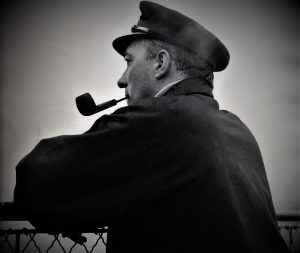WHEN HEROES DIE
22 Aug 2019
The scene: the bloodied quarterdeck of H.M.S. Frobisher, the smoke and fury of close action, and then the admiral turns and stares at his old friend, the coxswain, as if he would speak but cannot.
Then he saw Bolitho fall…. He leaped forward and caught him around the shoulders, holding him, lowering him carefully to the deck, everything else without meaning or purpose.
Men were cheering, some firing their muskets. It meant nothing.
From the starboard gangway Tyacke saw him fall, but knew he could not leave his men while they were boarding the enemy, following his orders. Midshipman Singleton, who had become a man this day, also saw him fall, and was on his knees beside him with Allday and Avery….
Shadows moved across the sun, and there were faint cheers, as if they came from another time, another victory. Some one reached around him and dabbed his face with a wet cloth. Bolitho recognised the sleeve: it was Lefroy, the bald surgeon.
He heard Allday’s painful breathing, and needed to tell him, to reassure him…. But when he tried to reach out for him, he realised for the first time that his hand was tightly gripped in Allday’s. Then he saw him watching him, his hair shaggy against the smoke and the sun.
It was wrong that he should be so distressed. One who had done so much. He tried again and said, “Easy, old friend, be easy now.” He felt Allday nod. “No grief, we always knew….”
Lefroy stood slowly, and said, “He’s gone, I’m afraid.”
SWORD OF HONOUR by Alexander Kent

Douglas Reeman
The typewriter keys continued to tap for ten minutes or so, and then there was silence. I looked into the study and my husband, Douglas Reeman, writing as Alexander Kent, was sitting staring at the page with an expression as stricken as any officer or man on that shattered quarterdeck.
“I never even saw him fall,” he said. “It just happened. I didn’t know it was going to be like that.”
It was the end of Sword of Honour, but it was not the end of the series: only his own death in 2017 could, and did, conclude it. But he never really recovered from the emotional impact of the death of his fictional hero, Richard Bolitho, and neither have his readers. The explosions that resulted, and the return fire from devotees of the Alexander Kent novels, rivalled the Battle of Trafalgar. We got, and as new readers discover the series, I still receive indignant or outraged or horrified messages beginning: “Why did you kill off Bolitho? Can’t it have been a case of mistaken identity? Can’t he still be alive somewhere, waiting to come back?” Or: “I could hardly finish the book, and I will never, ever, be able to read it again.” Serial rereaders, and there are thousands, actually refuse to read Sword of Honour again because they know what’s coming, and won’t put themselves through the anguish of reliving it. They skip it entirely and go on to the next in the series.
So why, at the risk of alienating readers, do we as writers “kill off” our characters? Why, particularly, the most beloved, the hero of a best-selling series?
Because all that is mortal must die. And if we as writers consider it vital to reflect the truths of life and death, we must acknowledge this. No one is immortal.
In the early 1970s, when the Bolitho series was becoming hugely popular, the publicity director at Hutchinson, subsequently to become part of the Random House group, designed a promotional bookmark featuring a chronology of Richard Bolitho’s life. It was a chronology that determined, even so early in the series, the trajectory of Bolitho’s life and career, from his birth in Falmouth in 1756 to his death on Frobisher’s quarterdeck in 1815.
Eventually it became inevitable: that book, Sword of Honour, had to be written. Douglas approached this philosophically (at first), saying, “It stands to reason that anybody who was born in 1756 would be dead by now.” It was not, however, a book he was eager to write.
He dreaded it. But he wrote it. To do otherwise, he said, would have been cowardly. And he was no coward, either physically or morally.
I learn, even now, from his integrity. There are three significant deaths in my novel Coronach, none of them deliberately engineered by me. One is the catalyst that brings together a man and a woman, both beloved by the man who dies. One is inevitable, and yet so shocking that when I had written the end of the scene I sat in complete silence for a few minutes, feeling I’d been kicked in the teeth. And the third is the finale, the last, lingering note in the symphony that is Coronach, and when I wrote that I felt, not exultation, but a sense of its fitness, that it could not have been other than what it was. As Thomas Hardy defined the highest tragedy: “The worthy encompassed by the inevitable.”
To write the story otherwise, to soften the lessons of life and death, to deny the truth, is to compromise.
And all heroes, mine and yours, transcend death, and in our hearts we hold them forever.
